|
|
|
Sort Order |
|
|
|
Items / Page
|
|
|
|
|
|
|
| Srl | Item |
| 1 |
ID:
124098
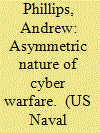

|
|
|
|
|
| Publication |
2012.
|
| Summary/Abstract |
How likely is it that a conflict between two combatants involving both kinetic and cyber operations would be an asymmetric one? And does the answer to that question depend on who the combatants are? In a kinetic scenario, the creation and "massing" of forces is often possible to observe. Whether it is the number of troops, warheads, or aircraft, one can physically monitor the activity. The buildup can be measured in days or weeks. Such a scenario involving state-of-the-art kinetic weaponry also needs a high level of expertise that only comes from years of education and training. One needs a well-funded organization to support this kind of activity.You can trace the kinetic matériel fairly accurately to its source, and the effects of a kinetic attack unfold over an observable period of time. You can watch and react to it. Defense is possible as long as you are sufficiently diligent and prepared with a response.
|
|
|
|
|
|
|
|
|
|
|
|
|
|
|
|
| 2 |
ID:
139296
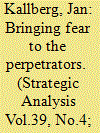

|
|
|
|
|
| Summary/Abstract |
Humanitarian cyber operations would allow democratic states to utilise cyber operations as a humanitarian intervention to capture information and create a foundation for decision making for collective international action supported by humanitarian international law. This follows the legal doctrine of responsibility to protect, which relies first on the nation state itself but when the state fails to protect its citizens, then the international community can act, ignoring the repressive or failed state’s national sovereignty.
|
|
|
|
|
|
|
|
|
|
|
|
|
|
|
|
| 3 |
ID:
192658
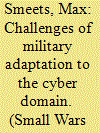

|
|
|
|
|
| Summary/Abstract |
Whilst NATO speaks increasingly publicly about the military use of cyber operations, adaptation to the cyber domain has reportedly been challenging for most militaries. Little research has sought to understand the nature of these challenges. This study seeks to address this gap through a case study of the Netherlands. By utilizing a range of primary and secondary sources, this article reveals that the Dutch Defense Cyber Command has faced significant constraints in its adaptation to the cyber domain, primarily due to issues related to organizational structure, operational mandate, and the availability of skills and resources. A cyber command that lacks regular opportunities for day-to-day operations and where personnel may not have continuous learning opportunities to acquire and refine their skills will encounter difficulties in recruiting, training, and retaining a proficient workforce. These findings highlight the tendency of observers to mistakenly equate the mere establishment of a cyber command with the existence of a robust military cyber capability – namely, the ability to effectively carry out and sustain a range of cyber operations for tactical or strategic purposes.
|
|
|
|
|
|
|
|
|
|
|
|
|
|
|
|
| 4 |
ID:
130364


|
|
|
| 5 |
ID:
186097
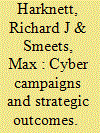

|
|
|
|
|
| Summary/Abstract |
While much focus has remained on the concept of cyberwar, what we have been observing in actual cyber behaviour are campaigns comprised of linked cyber operations, with the specific objective of achieving strategic outcomes without the need of armed attack. These campaigns are not simply transitory clever tactics, but strategic in intent. This article examines strategic cyber competition and reveals how the adoption of a different construct can pivot both explanation and policy prescription. Strategy must be unshackled from the presumption that it deals only with the realm of coercion, militarised crisis, and war in cyberspace.
|
|
|
|
|
|
|
|
|
|
|
|
|
|
|
|
| 6 |
ID:
187498
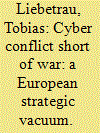

|
|
|
|
|
| Summary/Abstract |
Cyber conflict short of war plays an increasingly important role in contemporary security politics. Dedicated to a study of three European NATO members – the Netherlands, France and Norway, this article expands the existing focus of the study of cyber conflict short of war beyond its dominating US context. It compares and assesses how the countries perceive and respond to a changing strategic environment characterised by increasing cyber conflict short of war. The analysis demonstrates that all three countries acknowledge that cyber operations short of war alter the strategic environment and challenge the idea of deploying offensive cyber capabilities as purely a warfare matter. However, it also identifies a strategic vacuum, as none of them have formulated strategies that describe in detail how military and intelligence entities are supposed to approach and manage the new strategic environment. The article asserts that the current lack of strategic guidance is a fundamental challenge that puts European societies at risk and undermines democratic governance as navigating the new space of strategic cyber competition is a significant challenge to contemporary European statecraft. It concludes by noting three avenues for how to ameliorate this situation and fill the vacuum.
|
|
|
|
|
|
|
|
|
|
|
|
|
|
|
|
| 7 |
ID:
139499
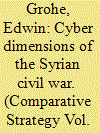

|
|
|
|
|
| Summary/Abstract |
The use of cyber operations, as well as the interaction of other elements of power that have an effect on cyber operations, represents another method by which nations and non-state actors may attempt to achieve political ends. The Syrian civil war has encompassed many elements of warfare, including cyber operations. A study of the observed cyber operations by both direct and indirect participants in the Syrian civil war can lead to valuable lessons regarding who operates in the cyber domain, what these operators can accomplish, and how a nation-state can respond. These lessons may be applied to future conflicts.
|
|
|
|
|
|
|
|
|
|
|
|
|
|
|
|
| 8 |
ID:
128705
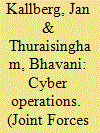

|
|
|
| 9 |
ID:
113382
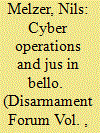

|
|
|
| 10 |
ID:
188891
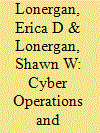

|
|
|
|
|
| Summary/Abstract |
In response to our article, “Cyber Operations, Accommodative Signaling, and the De-Escalation of International Crises,” we are delighted to engage with three scholars: Brandon K. Yoder, Fiona S. Cunningham, and Michael P. Fischerkeller. By way of background, this project grew out of our prior research on cyber operations’ limitations for coercion and the paucity of evidence that cyber operations cause escalation.Footnote1 Our inherent intuition was that cyber operations may be useful for conveying an aversion to significantly escalate disputes for some of the same reasons they are poor tools of coercion—and that this could help account for the relatively robust empirical finding that cyber operations are not associated with crisis escalation.Footnote2 Therefore, one part of our argument rests on cyber operations’ relatively limited effects compared to other tools at a state’s disposal.
|
|
|
|
|
|
|
|
|
|
|
|
|
|
|
|
| 11 |
ID:
161529
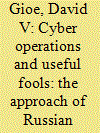

|
|
|
|
|
| Summary/Abstract |
This article argues that Russian intelligence has achieved recent success in influencing democratic elections and referenda by combining the traditional Human Intelligence (HUMINT) discipline of manipulating useful fools with cutting edge cyber tactics, including hacking, phishing, social engineering, and weaponizing purloined information. This essay further argues that this synthesis yields greater effects than the sum of its parts. Given its potency, democracies and NATO members should expect to confront this type of threat more often. The 2016 American presidential election is used as a case study to conceptualize Russian hybrid intelligence, a new term reminiscent of Soviet ‘complex active measures’ and updated for the twenty-first century.
|
|
|
|
|
|
|
|
|
|
|
|
|
|
|
|
| 12 |
ID:
188212
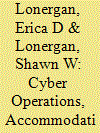

|
|
|
|
|
| Summary/Abstract |
Signaling is a core element of international crisis bargaining and coercive diplomacy. To succeed in crises, a state must convey to its opponent that it possesses the capability to impose an advantageous outcome and that it is resolved to do so, while also managing the risks of unintended escalation and war. However, less studied in signaling literature is how states can use signals for the purposes of managing escalation risks or even de-escalating crises. In this article, we develop a theory of signaling in cyberspace. We argue that, although cyber operations are not particularly well suited as costly signals of resolve or capabilities in the context of coercive diplomacy, they have a distinct utility for signaling to manage escalation risks. We build a framework organized around the causal mechanisms of accommodative signaling in cyberspace and test it against a set of comparative case studies. We find that cyber operations can act as accommodative signaling under some conditions, particularly when decision makers are faced with managing tensions between simultaneously signaling to domestic audiences and adversary governments.
|
|
|
|
|
|
|
|
|
|
|
|
|
|
|
|
| 13 |
ID:
188890
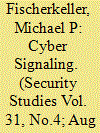

|
|
|
|
|
| Summary/Abstract |
In “Cyber Operations, Accommodative Signaling, and the De-Escalation of International Crises,” Erica D. Lonergan and Shawn W. Lonergan develop a theory of accommodative signaling that focuses on states seeking to de-escalate a crisis while simultaneously satisfying a nationalistic constituency. They test their claims against five case studies, arguing that all support their theory. But for various reasons, none do. In the cases where they claim cyber operations are used for accommodative signaling, there is compelling evidence that the operations are coercive tactics employed as part of a coercive strategy. In the case where they claim a cyber operation was a coercive signal, the covert operations scholarship used to build their theory would conclude that the operation was an accommodative signal or was not primarily intended to send a signal.
|
|
|
|
|
|
|
|
|
|
|
|
|
|
|
|
| 14 |
ID:
130650
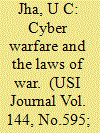

|
|
|
| 15 |
ID:
165133
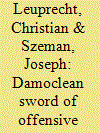

|
|
|
|
|
| Summary/Abstract |
Cyberspace is a new domain of operation, with its own characteristics. Cyber weapons differ qualitatively from kinetic ones: They generate effects by non-kinetic means through information, technology, and networks. Their properties, opportunities, and constraints are comparable to the qualitative difference between conventional and nuclear weapons. New weapons and their target sets in a new domain raise a series of unresolved policy challenges at the domestic, bilateral, and international levels about deterrence, attribution, and response. They also introduce new risks: uncertainty about unintended consequences, expectations of efficacy, and uncertainty about both the target’s and the international community’s response. Cyber operations offer considerable benefits for states to achieve strategic objectives both covertly and overtly. However, without a strategic framework to contain and possibly deter their use, make state and non-state behavior more predictable in the absence of reciprocal norms, and limit their impact, an environment where states face persistent attacks that nonetheless fall below the threshold of armed conflict presents a policy dilemma that reinforces collective insecurity.
|
|
|
|
|
|
|
|
|
|
|
|
|
|
|
|
| 16 |
ID:
149755
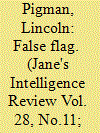

|
|
|
|
|
| Summary/Abstract |
Russia's cyber operations in Ukraine are increasingly dependent on criminal proxies. Lincoln Pigman examines what this means for cyber-security in Ukraine and beyond.
|
|
|
|
|
|
|
|
|
|
|
|
|
|
|
|
| 17 |
ID:
170890
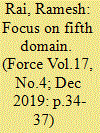

|
|
|
| 18 |
ID:
162723
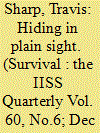

|
|
|
|
|
| Summary/Abstract |
Cyber operations may not impose much physical destruction, but they can squeeze at least three political pressure points: money, leadership and secrecy.
|
|
|
|
|
|
|
|
|
|
|
|
|
|
|
|
| 19 |
ID:
150986
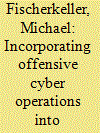

|
|
|
|
|
| Summary/Abstract |
Cyber capabilities, whether used alone or in combination with other military tools, offer an opportunity to influence an adversary’s decision-making.
|
|
|
|
|
|
|
|
|
|
|
|
|
|
|
|
| 20 |
ID:
138703
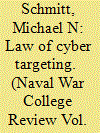

|
|
|
|
|
| Summary/Abstract |
The 2008 war between Georgia and Russia was predictably short, as Russian military might quickly trumped Georgian nationalist enthusiasm. Beyond its momentous geopolitical implications, it was the first war in which cyber activities loomed large; the conflict marked the public birth of “cyber war,” or at least cyber in war.
|
|
|
|
|
|
|
|
|
|
|
|
|
|
|
|
|
|
|
|
|